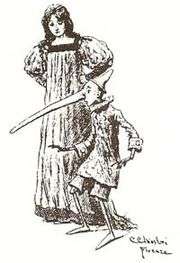Yablo's paradox
Yablo's paradox is a logical paradox published by Stephen Yablo in 1993. It is similar to the liar paradox.[1] Unlike the liar paradox, which uses a single sentence, this paradox uses an infinite sequence of statements, each referring to the truth values of the later statements in the sequence. Analysis of the statements shows there is no consistent way to assign truth values to all the statements. Since each sentence does not refer to itself, Yablo claims his paradox is "not in any way circular."[1] However, Graham Priest disputes this.[2][3]
Statement
Consider the following infinite set of sentences:
- (S1) For each i > 1, Si is not true.
- (S2) For each i > 2, Si is not true.
- ...
Analysis
Assume there is an n such that Sn is true. Then Sn + 1 is not true, so there is some k > n + 1 such that Sk is true. But Sk is not true because Sn is true and k > n. Assuming Sn is true implies a contradiction, Sk is true and not true, so our assumption is absurd. We must conclude for each i, the sentence Si is not true. But if Si is not true, it is also true, so we have the paradox that each sentence in Yablo's list is true and not true.
References
- 1 2 S. Yablo (1993). "Paradox Without Self-Reference" (PDF). Analysis. 53 (4): 251–252. doi:10.1093/analys/53.4.251.
- ↑ G. Priest (1997). "Yablo's paradox" (PDF). Analysis. 57 (4): 236–242. doi:10.1093/analys/57.4.236.
- ↑ J. Beall (2001). "Is Yablo's paradox non-circular?" (PDF). Analysis. 61 (3): 176–187. doi:10.1093/analys/61.3.176.
External links
- ""Liar Paradox"". Internet Encyclopedia of Philosophy.
- ""Yablo's Paradox"". Internet Encyclopedia of Philosophy.
